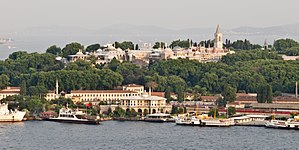Topkapı Museum
| Topkapı Palace | |
|---|---|
| Topkapı Sarayı طوپقپو سرايى |
|

View of Topkapı Palace from the Golden Horn
|
|
|
Location in Istanbul
|
|
| General information | |
| Type |
|
| Architectural style | Ottoman, Baroque |
| Location | Istanbul, Turkey |
| Coordinates | 41°0′46.8″N 28°59′2.4″E / 41.013000°N 28.984000°E |
| Construction started | 1459 |
| Client | Ottoman sultans |
| Owner | Turkish state |
| Technical details | |
| Structural system | Various low buildings surrounding courtyards, pavilions and gardens |
| Size | 592,600 to 700,000 m2 (6,379,000 to 7,535,000 sq ft) |
| Design and construction | |
| Architect | Mehmed II, Alaüddin, Davud Ağa, Mimar Sinan, Sarkis Balyan |
The Topkapı Palace (Turkish: Topkapı Sarayı or in Ottoman Turkish: طوپقپو سرايى, Ṭopḳapu Sarāyı) or the Seraglio, is a large palace in Istanbul, Turkey, that was one of the major residences of the Ottoman sultans for almost 400 years (1465–1856) of their 624-year reign.
As well as a royal residence, the palace was a setting for state occasions and royal entertainments. It is now a museum and as such a major tourist attraction. It also contains important relics of the Muslim world, including Muhammed's cloak and sword. The Topkapı Palace is among the monuments contained within the "Historic Areas of Istanbul", which became a UNESCO World Heritage Site in 1985, and is described under UNESCO's criterion iv as "the best example[s] of ensembles of palaces [...] of the Ottoman period."
The palace complex consists of four main courtyards and many smaller buildings. At its peak, the palace was home to as many as 4,000 people, and covered a large area with a long shoreline. It contained mosques, a hospital, bakeries, and a mint. Construction began in 1459, ordered by Sultan Mehmed II, the conqueror of Byzantine Constantinople. It was originally called the New Palace (Yeni Saray or Saray-ı Cedîd-i Âmire) to distinguish it from the previous residence. It received the name "Topkapı" (Cannon Gate) in the 19th century, after a (now lost) gate and shore pavilion. The complex was expanded over the centuries, with major renovations after the 1509 earthquake and the 1665 fire.
After the 17th century, the Topkapı Palace gradually lost its importance as the sultans preferred to spend more time in their new palaces along the Bosphorus. In 1856, Sultan Abdül Mecid I decided to move the court to the newly built Dolmabahçe Palace, the first European-style palace in the city. Some functions, such as the imperial treasury, the library, and the mint, were retained in the Topkapı Palace.
...
Wikipedia

